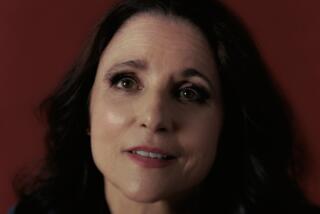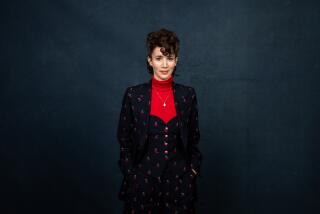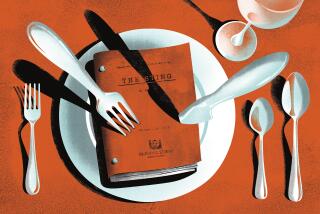She traded a paintbrush for a pen
- Share via
NEW YORK — Julia Glass arrives at a Greenwich Village cafe in a whirl of colors: turquoise scarf, shimmering purple peasant blouse, jade green glasses.
It is a fitting outfit for the former painter and author of the visually lush “Three Junes,” the winner of the 2002 National Book Award. The vibrant colors also call to mind one of the novel’s most distinct characters, an Eclectus parrot named Felicity who provides solace to her owner, Fenno McLeod, a gay man trying to weather the AIDS crisis in New York in the 1980s.
“Three Junes,” the 46-year-old Glass’ first novel, is a complex, sprawling work composed of intertwined narratives in Greece, Scotland and New York, and seen from the point of view of three characters. Those characters defy easy summation, which is no surprise, given that Glass is quick to name novelists Thomas Hardy and George Eliot as influences and claim that she herself aspires to the “magnificent richness [of] disciplined clutter.” Amid the many plot lines woven through the book, the focus is the haughty, isolated Fenno. Fearful of rejection and of the dangers of the world, he has disengaged from life and now struggles to find his way back to his family, his loves and himself.
Glass speaks of Fenno as one would a close but exasperating friend. His character came to her fully formed, she says, his life unfolding as she walked through the streets of Greenwich Village. Not a risk-taker herself and prone to self-doubt, Glass views him as a kind of warning to herself.
But if Glass’ friends are any indication, the novelist is hardly in danger of cocooning herself away from life. “People who know her get very attached to Julie,” says John Casey, winner of the 1989 National Book Award for “Spartina” and a 1994 judge for the prestigious literary prize. “I’m something of a mother-hen nag when it comes to her.” In conversation, Glass meanders often, her speech in keeping with the spacious, unhurried quality of her prose.
“The language part of my brain was meant to be used,” says Glass. “Visual art is a foreign language I’m fluent at, but my native language is language.” It took her a while to come around to this knowledge. After graduating from Yale University, the art major earned a fellowship to France and then settled in Cambridge, Mass., to work at Harvard University’s Fogg Art Museum and paint. It was a dream situation -- and she was miserable.
So in 1980, Glass moved to New York City, worked as a copy editor at Cosmopolitan magazine and continued to paint. Though her work appeared in a number of group shows, she didn’t thrive in the intimidating New York art scene. Increasingly, she found herself writing instead of painting. “I’d feel guilty,” says Glass. “But then I thought, this is ridiculous. If I want to write short stories, I’ll write short stories.” Which she did, working her way by stages to a novel. “Three Junes” sprang from the novella “Collies,” which won the 1999 Pirate’s Alley Faulkner Society medal for best novella, which, in turn, grew from a short story “about innocence and awakening” called “Souvenirs,” which she wrote in the 1980s.
Though “Three Junes” is her first finished novel, Glass was working on another prior to adapting “Collies.” The unfinished book had already begun to falter when Glass was hit by devastating news in 1992: breast cancer and the suicide of her younger sister. “I looked at that unfinished story as something belonging to another life entirely and knew I would never go back to it,” says Glass. “It’s funny how I often forget I ever started another novel at all.”
In retrospect, Glass says that her own grief and the “despairing sense of isolation” she felt at the time perhaps drew her to the novel’s first narrator, Fenno’s father, Paul McLeod, a grieving Scottish widower who had played only an incidental role in “Souvenirs.”
“As the novel grew out of these characters,” says Glass, “I came to feel that what I wanted to write, in essence, was a book about living beyond incurable heartbreak and irreparable loss.”
Ten years later, with two little boys, her longtime companion and now a National Book Award on her first try, somehow Glass seems just the person to write this book.
More to Read
Sign up for our Book Club newsletter
Get the latest news, events and more from the Los Angeles Times Book Club, and help us get L.A. reading and talking.
You may occasionally receive promotional content from the Los Angeles Times.










